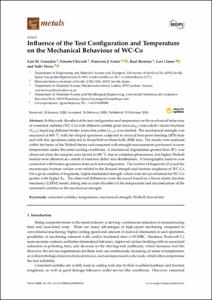Mostra el registre d'ítem simple
Influence of the test configuration and temperature on the mechanical behaviour of WC-Co
| dc.contributor.author | González, Luis M. |
| dc.contributor.author | Chicardi, E |
| dc.contributor.author | Gotor Martínez, Francisco José |
| dc.contributor.author | Bermejo, Raul |
| dc.contributor.author | Llanes Pitarch, Luis Miguel |
| dc.contributor.author | Torres, Yadir |
| dc.contributor.other | Universitat Politècnica de Catalunya. Departament de Ciència i Enginyeria de Materials |
| dc.date.accessioned | 2020-06-19T12:38:53Z |
| dc.date.available | 2020-06-19T12:38:53Z |
| dc.date.issued | 2020-03-01 |
| dc.identifier.citation | González, L. [et al.]. Influence of the test configuration and temperature on the mechanical behaviour of WC-Co. "Metals", 1 Març 2020, vol. 10, núm. 3, p. 322:1-322:12. |
| dc.identifier.issn | 2075-4701 |
| dc.identifier.uri | http://hdl.handle.net/2117/191207 |
| dc.description.abstract | In this work, the effect of the test configuration and temperature on the mechanical behaviour of cemented carbides (WC-Co) with different carbide grain sizes (dWC) and cobalt volume fractions (VCo), implying different binder mean free paths (¿Co), was studied. The mechanical strength was measured at 600 °C with bar-shaped specimens subjected to uniaxial four-point bending (4PB) tests and with disc specimens subjected to biaxial ball-on-three-balls (B3B) tests. The results were analysed within the frame of the Weibull theory and compared with strength measurements performed at room temperature under the same loading conditions. A mechanical degradation greater than 30% was observed when the samples were tested at 600 °C due to oxidation phenomena, but higher Weibull moduli were obtained as a result of narrower defect size distributions. A fractographic analysis was conducted with broken specimens from each test configuration. The number of fragments (Nf) and the macroscopic fracture surface were related to the flexural strength and fracture toughness of WC-Co. For a given number of fragments, higher mechanical strength values were always obtained for WC-Co grades with higher KIc. The observed differences were discussed based on a linear elastic fracture mechanics (LEFM) model, taking into account the effect of the temperature and microstructure of the cemented carbides on the mechanical strength. |
| dc.language.iso | eng |
| dc.publisher | Multidisciplinary Digital Publishing Institute (MDPI) |
| dc.rights | Attribution 4.0 International (CC BY 4.0) |
| dc.rights.uri | http://creativecommons.org/licenses/by-nc-nd/3.0/es/ |
| dc.subject | Àrees temàtiques de la UPC::Enginyeria dels materials::Metal·lúrgia |
| dc.subject.lcsh | Metals |
| dc.subject.lcsh | Carbides |
| dc.subject.other | Cemented carbides |
| dc.subject.other | Temperature |
| dc.subject.other | Mechanical strength |
| dc.subject.other | Weibull |
| dc.subject.other | Biaxial test |
| dc.title | Influence of the test configuration and temperature on the mechanical behaviour of WC-Co |
| dc.type | Article |
| dc.subject.lemac | Metalls |
| dc.subject.lemac | Carburs |
| dc.contributor.group | Universitat Politècnica de Catalunya. CIEFMA - Centre d'Integritat Estructural, Fiabilitat i Micromecànica dels Materials |
| dc.identifier.doi | 10.3390/met10030322 |
| dc.description.peerreviewed | Peer Reviewed |
| dc.relation.publisherversion | https://www.mdpi.com/2075-4701/10/3/322 |
| dc.rights.access | Open Access |
| local.identifier.drac | 27832103 |
| dc.description.version | Postprint (published version) |
| local.citation.author | González, L.; Chicardi, E.; Gotor, F.; Bermejo, R.; Llanes, L.; Torres, Y. |
| local.citation.publicationName | Metals |
| local.citation.volume | 10 |
| local.citation.number | 3 |
| local.citation.startingPage | 322:1 |
| local.citation.endingPage | 322:12 |
Fitxers d'aquest items
Aquest ítem apareix a les col·leccions següents
-
Articles de revista [733]
-
Articles de revista [283]


